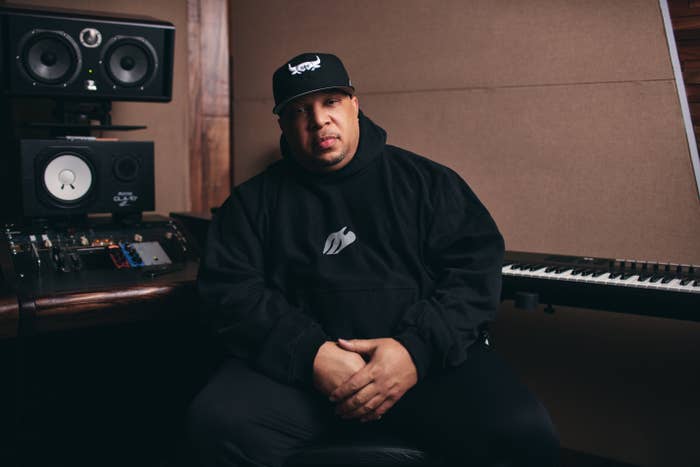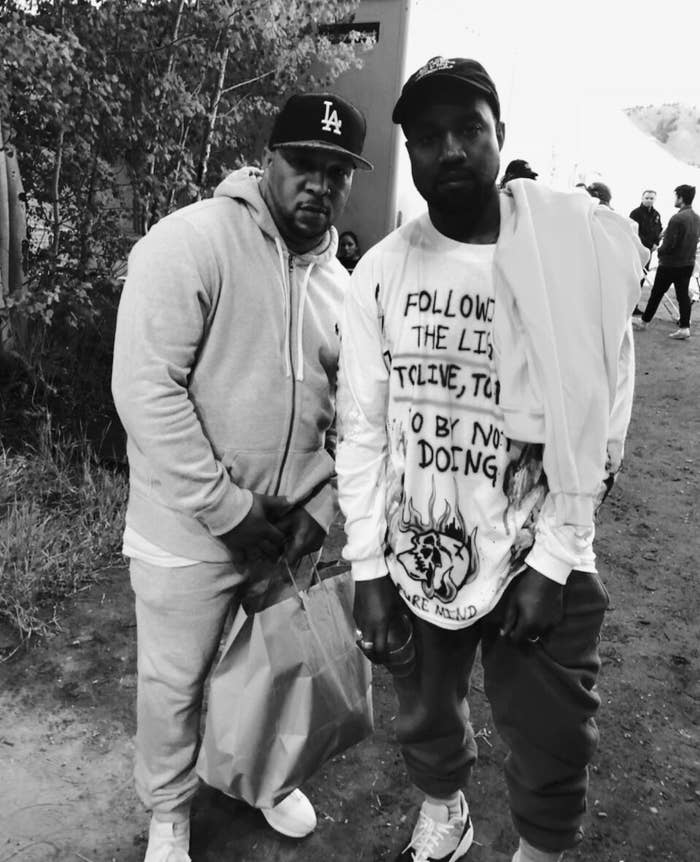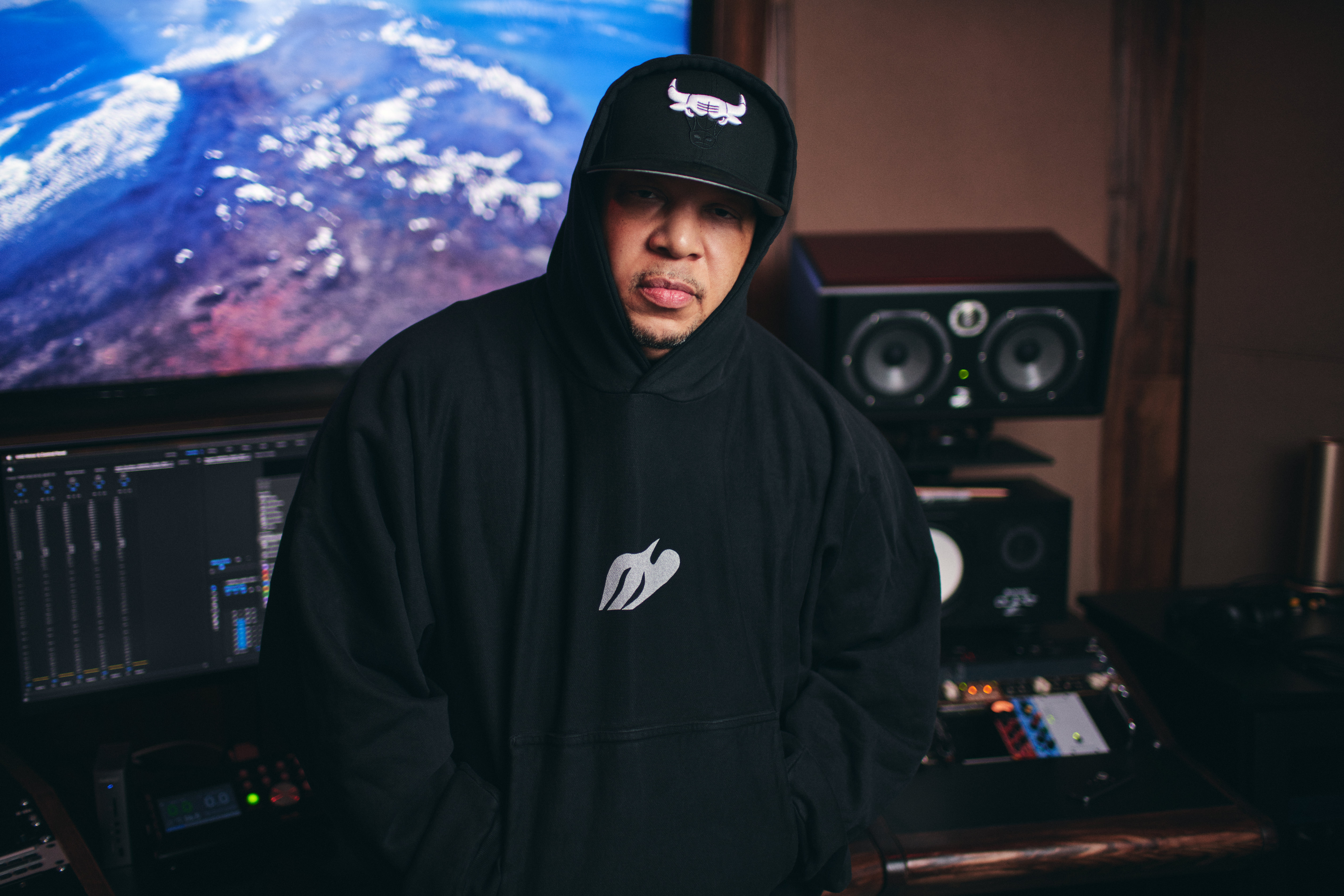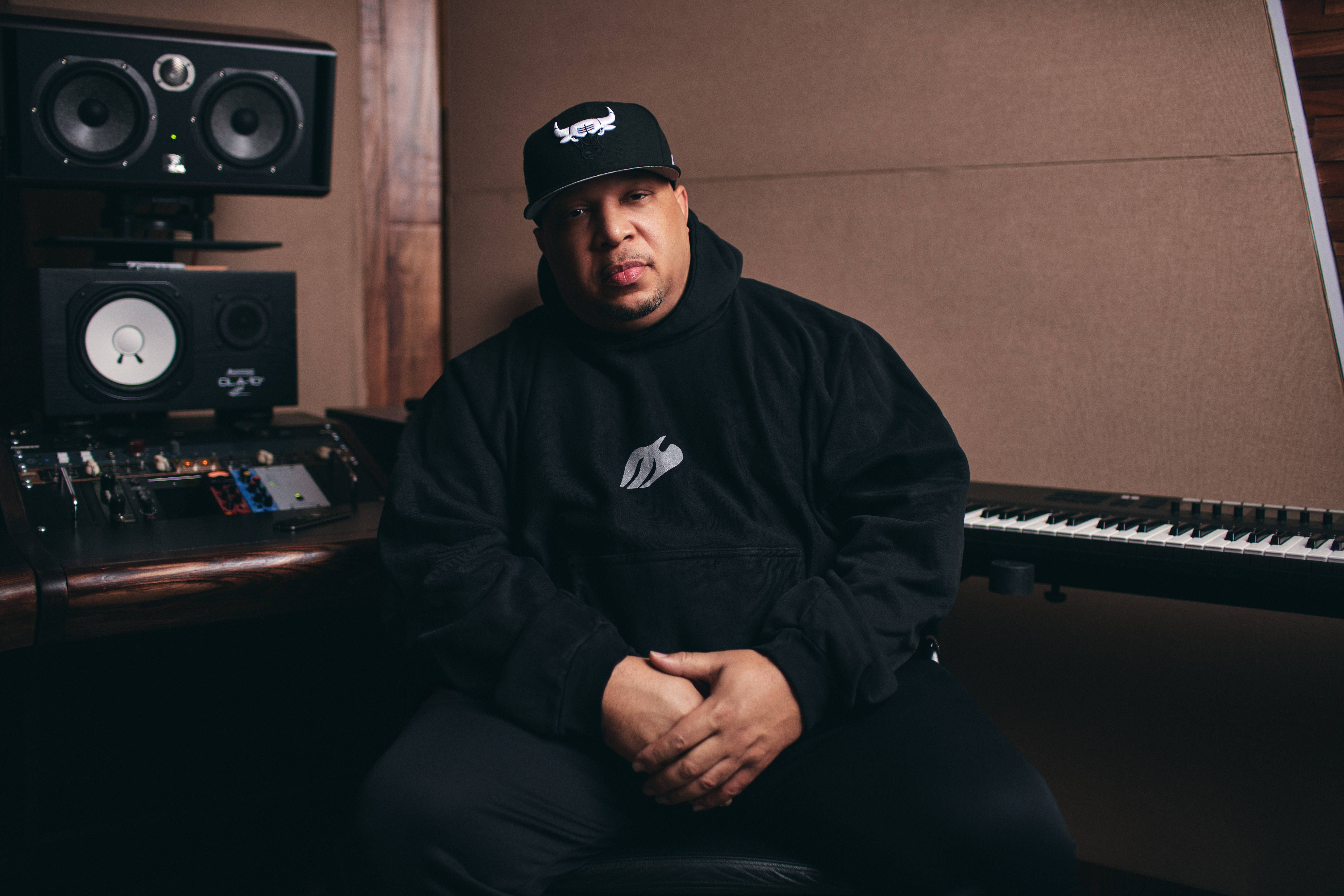
If you’re looking for insights into Kanye West’s creative universe, there aren’t many people better to speak with than BoogzDaBeast. The Grammy-winning producer is one of Ye’s oldest collaborators, having worked with him for nearly 25 years. The two first came across each other as teenagers, crossing paths several times in rap battle spaces, before formally meeting when Boogz’s rap group, the Euphonics, went to Ye’s home studio to record. During the session, Boogz and Kanye shared beats they were both making, and as Boogz tells Complex, “The rest is history.”
Fast forward to 2022, and BoogzDaBeast is still a vital part of Kanye’s creative team, after contributing to albums like Yeezus, Cruel Summer, Kids See Ghosts, and Jesus Is King. In the past two years, he’s taken a lead role in the production of both Donda and Donda 2. In addition to landing production credits on many of the songs, including standouts like “Hurricane,” “Pure Souls,” “No Child Left Behind,” “Believe What I Say,” “Moon,” “Heaven and Hell,” Boogz tells Complex that he wore many hats during the making of these albums, serving as head of production.
When describing the recording process, Boogz illustrates a very collaborative environment, where everyone pitched in. He tells stories about Fivio Foreign and Pusha-T carrying boxes and moving tables between recording sessions, and reveals that Kanye wasn’t afraid to get his hands dirty.
“Listen, Kanye will pick up the broom,” he says. “He’ll be like, ‘Man, it’s a little dirty in here.’ He’ll start picking up trash. He’s like, ‘Can we move this table?’ And he’ll just grab the end of the table and you grab the other end. When I tell you he’s hands-on, he’s hands-on. It’s his album. It’s his project. It’s his baby. It has his mother’s name on it. He’s not about to let that just be controlled by somebody else. Not at all. He’ll grab your trash and throw it away. He’s like, ‘You done with this?’ And he’ll just throw that shit away. He’s really down to earth, man. The media shits on him, but he’s real cool, down to earth. Always has been.”
In February, several songs from Donda 2 were uploaded to Kanye’s Stem Player, and as of late March, fans are still waiting for the full, finished album to be released. Unfortunately, Boogz is cryptic when asked about whether the album is finished or not. “Only the boss can tell you that,” he says. In the meantime, Boogz was able to be more candid about what goes on behind the scenes in Kanye’s world. Catching up with Complex this week, Boogz spoke about the making of both Donda albums, working out of the Mercedes-Benz stadium for 30 days, and more. The interview, lightly edited for clarity, is below

How did you first get into music and production?
My older brother was a DJ, and growing up [we were] watching Beat Street and Krush Groove, Rap City, Friday Night Videos—anything that was available as far as hip-hop was concerned. So, of course, I wanted to be a rapper like everybody else. Nobody knew what a producer did. I wanted to be LL Cool J. And then my friends and I had a little crew. We were rapping, but nobody would give us beats. Producers were hard to find, and if they did have beats, they were giving it to the artist they were working with. So I basically started making beats so my group could have beats. That’s the short story.
How and when did you first meet Kanye?
I had a crew called Euphonics. We were doing a lot of hip-hop shows, and we used to do the local party scene heavy. Sometimes there were freestyle battles for small cash prizes, and [Kanye] was always there. He was ready to rap if they were freestyling, and he was ready to battle if they were battling.
I’d met him a few times, but the time we formally met, a couple guys and I were going to record a demo, and a friend of mine said, “We should go record it over at Kanye’s house.” I didn’t know he recorded. Having equipment in your house was a big thing. It’s not like now, where you can go get a computer from Best Buy, download some programs, and buy a microphone from Guitar Center. This was different. You had to make a financial investment. So we were going to record the song, and he picked us up.
I think I was about 18, and I was producing by this time, so I started playing beats for him in the car and he said, “I like those.” He started playing some beats he made, and I was blown away. I couldn’t believe somebody that was only a year older than me was this advanced. It was kind of like watching Kobe or LeBron playing basketball in high school. They’re ready for the league at such a young age. So we came, we did the song, and after that, I just asked him if he could give me some sounds, something to help me with my production. He picked me up the next day, and the rest is history.
“Kanye’s recording in the coach’s locker room, and he’s sleeping there. You saw the setup. That was real. He slept in there all 30 days. And it was successful.”
What do you think it is about your style that made Kanye want to work with you?
My style fits him. I have a hard side, but then I have an R&B side. It’s always going to be hip-hop. You’ve got to remember, this was the ’90s and everything was hard. Even Bad Boy, for all the shiny-suited things they say about Puff, Bad Boy had some of the hardest beats in the history of hip-hop, as well as some commercial singles. So we were caught right in that era. That’s when we started really getting into production. So Kanye was everything. He was Puff. He was Timbaland. He was the RZA. In terms of style. Me, I was just hard. I didn’t have any soft edges. Maybe I was Robin to Batman. We didn’t really know what the hell we were doing. He started a production company, Kanman Productions. I was the first person that we brought on. We just wanted to be the hit man. We just wanted to be like Bad Boys. We wanted to be like Roc-A-Fella.
How has your approach to creating music changed over the years?
It’s funny because I would say it hasn’t. I wouldn’t say my process changed. I’ve been doing the same thing this whole time. Timing is everything. Sometimes your sound may be advanced, and I’m not saying that egotistically. Sometimes the industry or the public, they’re just not ready for it yet. And then everything goes in a cycle. We got back to sampling ‘90s records. Well, that’s our era. We call them the flips. When the flips came back, I jumped right in. That’s how you start getting Dave East with the Jodeci sample, Teyana with the Mase samples.
Even though we still have trap and drill happening at the same time, there’s more of the ‘90s sound being brought back. It’s not uncommon to hear a flip on someone’s album right now. So I was still making beats. I’m still here. Now you’re going back to my high school years? You’re not going to leave me out. It’s my shit. You’re copying us now. You know what I mean?
After working on Jesus Is King, it’s been reported that you brought 166 new beats to Wyoming for Donda. Can you talk about that?
Let me just say this—we never stop working. So we already had the theme for Jesus Is King, which is gospel. But at the same time, while I’m not working on Jesus Is King, what am I doing? I’m still creating. I’m still working on new records. So about a month after Jesus Is King had been released, he called me to Wyoming. He was like, “Man, we’re going back in, we’re about to do a new album. Let’s keep this going. What you got?” So I came to Wyoming and I had like 166 beats. Let me clarify, not full beats. Let me say 166 ideas. Sometimes you’ve just got fragments and ideas you want to present. But it doesn’t matter, because with him, he’s a producer as well, which is different than with most artists.
With most artists, you have to come with a full idea. With him, you can come with a small music loop and he’ll see the whole vision for it. So I came with 166 ideas and he freestyles about 99 of them, and we constructed and worked on them. Again, he’s a producer. He’s not the guy that doesn’t touch the beat. He’s not the guy that sits there and just slaps his name on shit. That’s not him. I don’t think his ego can handle not being a part of the record. No, he was very hands-on. And the idea, he brings it home, even if the initial concept was yours. By the time he gets to the finish line, his hands are all over it. His hands are dirty. He’s definitely in there.
What is it like working with Kanye on projects where he also acts as a producer?
You have to remember, this is my teacher. This is my sensei. I’m still excited to work with him. Even though we’ve had incredible success, I still get geeked about it. [I want to see] what his take on it is. What is his idea? I know what I’ve done and I know where I would like to take it. But then you see where he’s taking it, and you’re like, “Oh, man, I didn’t even think of that.” So now that we’re going in this direction, along with the direction I presented, it’s almost like a new beat all over again. You may have hit a roadblock with the beat, or you may have taken it as far as you can take it, and then there’s another producer to say, “Oh, what about this? What if we try this?” And now your whole spark of energy is back and you’re ready.
It’s fun working with a producer and an artist. We’re working on the music, but he’s also freestyling or scatting ideas for the song at the same time. It’s a process like nobody’s ever worked, and if you talk to anybody that’s worked around him, they’re going to tell you the same thing. They’re going to say, “I’ve never worked on an album like this… this way.” You can’t be lazy over there.
“Kanye’s hands-on. It’s his album. It’s his project. It’s his baby. It has his mother’s name on it. He’s not about to let that just be controlled by somebody else. Not at all. He’ll grab your trash and throw it away.”
Do you find that you wear multiple hats during the creation of Kanye’s albums?
Absolutely. I did a little of everything. As far as production, I was one of the lead producers. Also, I was the production manager. I was head of production, meaning as far as scheduling, making sure that the artists had the right equipment. The hiring, the firing, unfortunately, of engineers, the staff people for the whole project. Even A&R administration, everything. But that’s how it is over there. It’s a team effort. It’s a family environment. You put on whatever hat’s available. There are some people that are just there to engineer, but when you’re one of the 25-year friends and you see a need for something, you do it. That’s just how we are. That’s just how it goes.
In the end, you realize you’ve done more than just rap. You’ve done more than just make beats. It’s not uncommon to see Fivio Foreign carrying some boxes. It’s going to happen. Trust me, when I tell you. You might see Pusha-T over there moving a table or something. We’ve got to get it done. They’ll tell you. He’s the boss. He’s the big man. Oh, and he’ll pick up things himself. Listen, Kanye will pick up the broom. The billionaire. He’ll be like, “Man, it’s a little dirty in here.” He’ll start picking up trash. He’s like, “Can we move this table?” And he’ll just grab the end of the table and you grab the other end. When I tell you hands-on, he’s hands-on. It’s his album. It’s his project. It’s his baby. It has his mother’s name on it. He’s not about to let that just be controlled by somebody else. Not at all. He’ll grab your trash and throw it away. He’s like, “You done with this?” And he’ll just throw that shit away. Really down to earth, man. The media shits on him, but he’s real cool, down to earth. Always has been.
What was it like working on Donda in Mercedes-Benz Stadium?
I was there every day. I don’t think anyone can say that they did an album in a football stadium. That alone makes it different. Even before we started working, that was different. Think about having to set up all the recording stations and production spaces. Then we’ve got the great Mike Dean mixing records in the same place.
We took over this locker room and we set up the space for Mike Dean. We have all these drop cloths and stuff, trying to make it insulated so the sound doesn’t bounce anywhere, so he can mix the record. But 20 feet away is a 70-plus-thousand-seater that we were filling up in the next three days. And we did it twice!
I don’t know if you’ve ever been inside of a football stadium, but it has a locker room, a coach’s locker room, and an assistant’s locker room. You have the bathroom, the closet, and all these different spaces. They’re all occupied. We would take the broom closet and put a microphone in there. That’s where so-and-so-so-and-so will be doing his verses. I know this for a fact because I was the one setting them up. So we had Pardi Fontaine, a good friend of mine and an amazing writer, set up in one of the box suites where you watch the game from. But it’s just a microphone, a computer, and he’s in there recording himself. Then you have Kanye, he’s in the coach’s locker room recording and he’s sleeping there. You saw the setup. That was real. He slept in there all 30 days. And it was successful.
“2 Chainz is right there on the locker room bench, writing his verse, recording on a microphone that’s set up on a lunchroom table. No luxury. Like Gilligan’s Island.”
Was there always a plan to work on a sequel to Donda?
I can’t say yes, because I don’t recall it. All I know is we’re always working, so I knew something would come after Donda. I can’t say that it was Donda 2—I just knew something else would come. Just like I knew something else would come after Jesus Is King. But as far as a follow-up to the previous, not really, because he’s never really done a part two, if you’ve noticed.
What are the challenges with continuously working on projects?
I don’t stop. You hear people saying, “Music is my life.” Well, it actually is for me. It’s enjoyable. It’s my entertainment. It’s my job. It’s also my duty. So in that regard, I feel there’s a responsibility there. I want to do it. I have to do it, and I enjoy doing it, so there’s not really too many things that can pull me away from it. And it’s ever-changing. It’s ever-challenging. It doesn’t exist prior to you creating it. The beat that I’m going to make today? No one’s ever heard it. I haven’t heard it. So to think that every day you get to create something and bring something into the universe that’s never been here… That’s a pretty interesting power. Why would you want to do anything else?
What is your favorite memory from working on both Donda albums?
The whole stadium setup. We were a family up in there—even people that you didn’t necessarily know too much beforehand, like a producer, a writer, or even some of the staff members. Remember when [Denzel Washington’s character in Remember the Titans] took them away to that camp? They didn’t know each other, or hated each other. But after they came back, they were like brothers. The rest of the world looked crazy, but to them, they were like, “No, we’re brothers.” That’s kind of how it was when it was over.
I’m telling you, when we got in his pocket and when we found our stride, it was over. Everybody in there was like a family at the end. We didn’t even leave. You got your hair cut there. Like I said, Fivio’s doing his verse—he’ll go get his line up and he’ll go back and keep recording. Kanye will go in there, get his hair cut. Shout out to Chef Willie for keeping the food going, because we didn’t have to leave to eat. We had Chef Willie there, three meals a day. So there was no reason for you to leave at all. Now, everybody didn’t stay in the bunker every night, except Kanye; but there was a hotel like a block away and we were all there. So trust me, we were there. It’s not a joke. It’s not a lie. We were in there for 30 days, and we had meetings every morning. Every morning at 10 o’clock. I think I worked from 10 a.m. to 4 a.m. or 5 a.m. every day.



